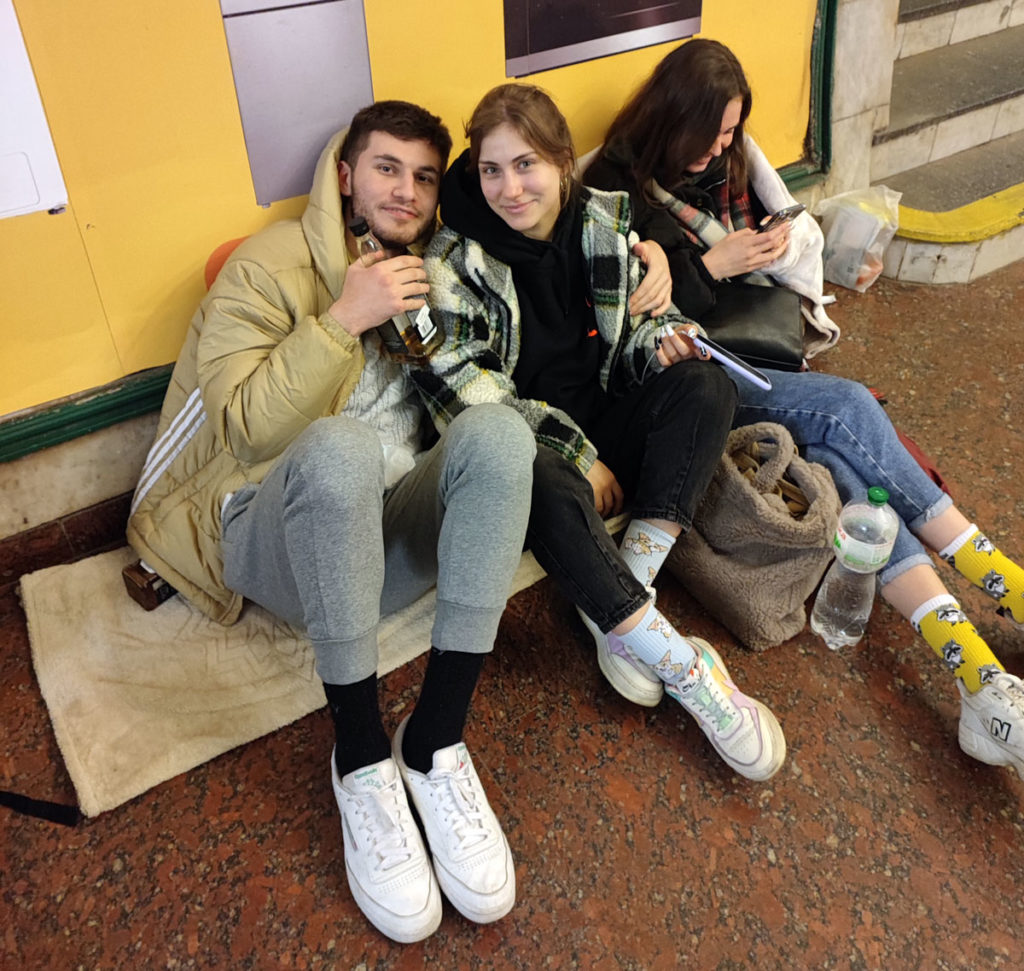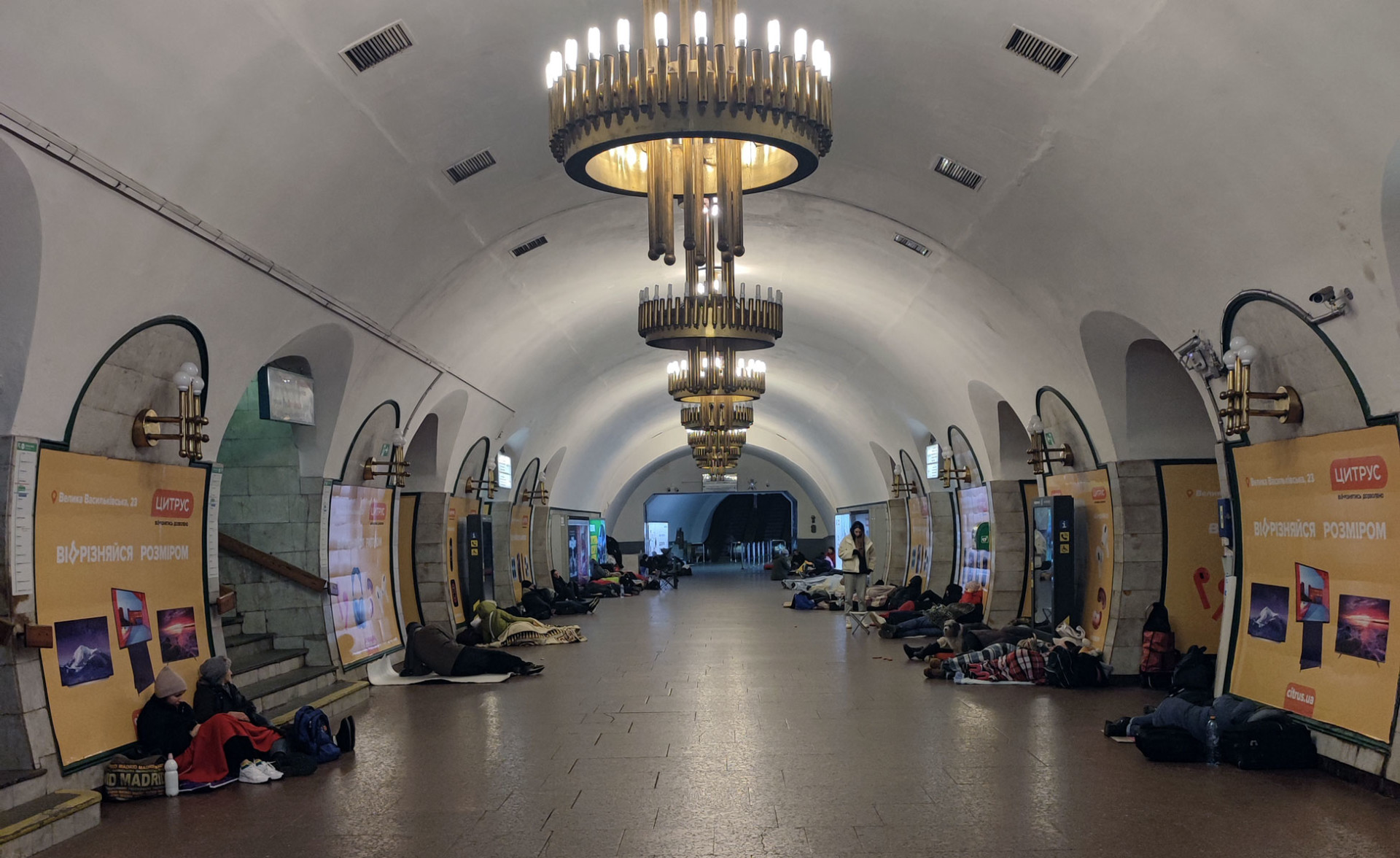As the Kremlin continues its assault on Ukraine, 25-year-old Platon and 19-year-old Barbara will spend another night underground in Kyiv’s metro. Platon, who is Russian, and Barbara, from Ukraine, first met on Tinder two years ago. Now they lie in each other’s arms on the cold stone floor of Kyiv’s Lva Tolstoy metro station sheltering from Russia’s bombs. They came well prepared with two 500 milliliter bottles of Jack Daniels, one of which they’ve already polished off.
Platon runs a money transfer company and makes money off his crypto portfolio, and Barbara is a university student. Their parents are safe at home on the other side of the Dnieper River, but the couple are trapped on the west bank of the river, home to the government institutions that are the targets of the Russian Armed Forces.
“I have been in Russia and Ukraine, and the difference is that Ukraine is a free country,” says Platon, who describes himself, tongue slightly in cheek, as an “anarcho-capitalist” while thumbing a Russian-language copy of Dale Carnegie’s “How to Win Friends and Influence People.” “I want to be rich, and here in Ukraine if you get rich, you are free. In Russia, if you get rich you are still a servant of [Russian President Vladimir] Putin.” Platon claims to not be scared, but the suspicious look Barbara throws him suggests she doesn’t believe this.

These young lovers are just two of the thousands of civilians hiding out in Kyiv’s network of bomb shelters. Kyiv’s underground tunnel network was built to withstand not just a conventional air bombardment, but a nuclear war, and it boasts the world’s deepest metro system. The stations of Kyiv, some of which are over 230 feet deep, offer the best protection against the rocket systems and cruise missiles that have been slamming into military and civilian targets in Kyiv for the best part of four days. While hundreds of thousands have fled for the safety of west Ukraine and neighboring countries, many others lack access to transport, and the government has yet to put together a proper evacuation plan for civilians trapped in Ukraine’s besieged cities.
Thanks to a determined Ukrainian resistance, the Kremlin’s forces have so far been prevented from capturing cities, and after a fourth day of bombing on the capital, Kyiv remains under Ukrainian control. Overnight on Saturday, Ukraine’s second city of Kharkiv was under heavy attack as Russian troops entered the city.
During the day, the streets in Kyiv are deserted. On Saturday, Kyiv’s mayor, Vitali Klitschko, announced that no one in the city would be allowed on the streets until Monday morning. Anyone spotted breaching this curfew “will be considered members of the enemy’s sabotage and reconnaissance groups” and could be shot on sight.
Conditions in the metro’s shelters are getting worse. People huddle on the floor with blankets, many with young children, others with cats, dogs and even a few pet rabbits. There is nothing in the way of insulation, and a cold draft blows toward everyone from the train tunnels. There is only a pair of squat toilets to share with any of the hundreds of people down here.
All sections of Ukrainian society, old and young, rich and poor are represented among the huddled masses. Less than a month ago, Viktoria Zavhorodnia, 30, had been helping coordinate Ukraine Fashion Week, preparing some of the country’s supermodels for their moment on the catwalk. Then, after the air raid sirens came, she had no choice but to head to her nearest bunker. “I took my documents, some clothes and some food, and that is it. Went down there, so many people laying on the floor, between the escalators, everywhere. I took a place on the stairs. It was a very uncomfortable, cold floor. I didn’t take any blanket or something, so I had to sit on my backpack with some clothing inside but still very soft. You cannot do anything except think about what is going on. You cannot relax. You feel helpless and worthless, like a piece of meat.”
Many Kyiv residents see those in the bomb shelters as the lucky ones. “If I die, tell all my haters, I’ll be torturing you in the next life,” Anastasia Alexeynuk, 24, said as Russian fighter jets streamed over her house in Bucha, not far from the hotly contested Hostomel airport on the outskirts of Kyiv. For hours, she posted video stories on Instagram where you could hear constant fighting between Russian paratroopers, who seized the airport in the middle of the afternoon. The Ukrainian army later regained control, but fierce fighting has continued. When I sent her a message on Friday to ask how she was doing, she replied, “Chechens outside my apartment block … I’m hiding!”
The metro stations really start to fill up at night, and many residents spend more time here than at home. But not everyone intends to stay here for long. At the Maidan Nezalezhnosti metro station, Anya, a 25-year-old designer, said that she didn’t plan to be there for long. “As soon as the Russians enter the city, I’m going to make Molotov cocktails,” she said.
Despite this, some residents privately grumble that they have not had nearly enough preparation to survive sheltering in place. None of the three metro bunkers I visited had supplies of food or water, and people were expected to bring their own blankets.
Tim, a 31-year-old computer programmer, says his drink of choice is cognac, which he carries in a little hip flask and offers sips to the needy. “I am not a big Ukrainian nationalist, but I grew up in this city, I can’t believe we are seeing it like this,” he says. “At least I know that this will be the end for Russia. No one will deal with them again — they’re going to be like Iran or North Korea.” He wants to take a train out west, but his family can’t travel, so he plans to stay with them in the shelters and wait out the Russian assault.
At around 4 a.m. on Friday, the first missiles began to fall on Kyiv. Those who were still awake were glued to their phones, refreshing Twitter and Telegram for news about where the strikes were hitting and if there were any casualties. Barbara was fast asleep by then and Platon pulled her a little closer, kissed her forehead and stroked her hair. “She is a bit crazy,” he says, with a grin. “But I know she loves me. And I very much love her.”
Sign up to our mailing list to receive our stories in your inbox.



